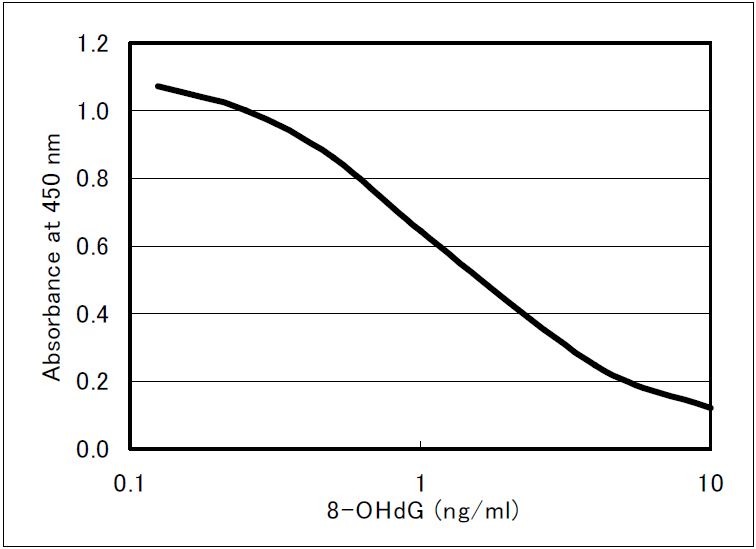8-OHdG Check ELISA Kit (High Sensitivity)
Product Code:
JAI-KOG-HS10E
JAI-KOG-HS10E
Regulatory Status:
RUO
RUO
Shipping:
BLUE ICE
BLUE ICE
Storage:
+4°C
+4°C
No additional charges, what you see is what you pay! *
| Code | Size | Price |
|---|
| JAI-KOG-HS10E-1Kit | 1 Kit | £871.00 |
Quantity:
Prices exclude any Taxes / VAT
Stay in control of your spending. These prices have no additional charges, not even shipping!
* Rare exceptions are clearly labelled (only 0.14% of items!).
* Rare exceptions are clearly labelled (only 0.14% of items!).
Multibuy discounts available! Contact us to find what you can save.
This product comes from: Switzerland.
Typical lead time: 10-14 working days.
Contact us for more accurate information.
Typical lead time: 10-14 working days.
Contact us for more accurate information.
- Further Information
- Documents
- References
- Related Products
- Show All
Further Information
Alternate Names/Synonyms:
8-hydroxy-2' -deoxyguanosine
Assay Type:
Competitive
Detection Type:
Colorimetric
EClass:
32160000
Form (Short):
liquid
Handling Advice:
Do not freeze.
Long Description:
Kit. Specific for 8-OHdG. Has been tested to 8-OHdG analogues (guanosine(G),7-methyl-G, 6-SH-G, 8-Bromo-G, dA, dC, dT, dI, dU, dG, O6-methyl-dG,8-OHdA, guanine(Gua),O6-methyl-Gua, 8-OH-Gua, uric acid, urea, creatine, creatinine, 8-sulfhydryl-G, 8-OH-G). Range: 0.125 to 10 ng/mL. 8-hydroxy-2'-deoxyguanosine (8-OHdG) is a modified base that occurs in DNA due to attack by hydroxyl radicals (incl. singlet oxygen and direct photodynamic action) that are formed as byproducts and intermediates of aerobic metabolism and during oxidative stress. There is increasing evidence to support the involvement of free radical reactions in the damage of biomolecules that eventually lead to several diseases in humans, such as atherosclerosis, cerebral and heart ischemia-reperfusion injury, cancer, rheumatoid arthritis, inflammation, diabetes, aging, and neurodegenerative conditions, such as Alzheimer's disease. 8-OHdG is popular as a sensitive, stable and integral marker of oxidative damage in cellular DNA and can be detected in tissue, serum, urine and other biomaterials. This ELISA Kits works also for DNA extracted from cultured cells or tissues.
Other data:
This ELISA Kits works also for DNA extracted from cultured cells or tissues. Detection Guide for Serum/Plasma http://www.jaica.com/e/8ohdg_serum.html Detection Guide for tissue samples or cultured cells http://www.jaica.com/e/8ohdg_tissue.html
Package Type:
Box
Product Description:
8-hydroxy-2'-deoxyguanosine (8-OHdG) is a modified base that occurs in DNA due to attack by hydroxyl radicals (incl. singlet oxygen and direct photodynamic action) that are formed as byproducts and intermediates of aerobic metabolism and during oxidative stress. There is increasing evidence to support the involvement of free radical reactions in the damage of biomolecules that eventually lead to several diseases in humans, such as atherosclerosis, cerebral and heart ischemia-reperfusion injury, cancer, rheumatoid arthritis, inflammation, diabetes, aging, and neurodegenerative conditions, such as Alzheimer?s disease. 8-OHdG is popular as a sensitive, stable and integral marker of oxidative damage in cellular DNA and can be detected in tissue, serum, urine and other biomaterials.
Range:
0.125 to 10 ng/mL
Sample Type:
Plasma, Serum, Urine
Specificity:
Specific for 8-OHdG. Has been tested to 8-OHdG analogues (guanosine(G),7-methyl-G, 6-SH-G, 8-Bromo-G, dA, dC, dT, dI, dU, dG, O6-methyl-dG,8-OHdA, guanine(Gua),O6-methyl-Gua, 8-OH-Gua, uric acid, urea, creatine, creatinine, 8-sulfhydryl-G, 8-OH-G).
Transportation:
Non-hazardous
UNSPSC Category:
ELISA Kits
UNSPSC Number:
41116126
Use & Stability:
12 months after the day of manufacturing. See expiry date on ELISA Kit box.
Documents
References
Quantitative determination of urinary 8-hydroxydeoxyguanosine (8-OH-dg) by using ELISA: S. Saito, et al.; Res. Commun. Mol. Pathol. Pharmacol. 107, 39 (2000) [Development and assessment of 8-OHdG Check ELISA] | Discrepancies in the measurement of UVC-induced 8-oxo-2'-deoxyguanosine: Implications for the analysis of oxidative DNA damage: M.D. Evans, et al.; BBRC 259, 374 (1999) [High correlation between HPLC-ECD when 8-OHdG in DNA samples] | Mutagenicity of reactive oxygen and nitrogen species as detected by co-culture of activated inflammatory leukocytes and AS52 cells: H.W. Kim, et al.; Carcinogenesis 24, 235 (2003) [Detection of 8-OHdG in cultured cells] | Significance of 8-hydroxy-2'-deoxyguanosine levels in patients with idiopathic dilated cardiomyopathy: E. Watanabe, et al.; J. Card. Fail. 12, 527 (2006) [Serum 8-OHdG in IDC patients] | Acute encephalopathy with refractory status epilepticus: Bilateral mesial temporal and claustral lesions, associated with a peripheral marker of oxidative DNA damage: T. Shiihara, et al.; J. Neurol. Sci. 250, 159 (2006) [Measurement of 8-OHdG in human urine, serum and cerebro spinal fluid(CSF)] | Effects of caloric restriction on post-spawning death of ayu: R. Nagasaka, et al.; Exp. Gerontol. 40, 556 (2005) [Detection of 8-OHdG in fish tissues (brain and liver)] | Salivary 8-OHdG: a useful biomarker for predicting severe ED and hypogonadism: M. Yasuda, et al.; J. Sex. Med. 5, 1482 (2008) [Detection of 8-OHdG in saliva] | Click here for more literature references! http://www.jaica.com/e/technical_forum_8ohdg.html#8OHDG_KIT_REF
Related Products
| Product Name | Product Code | Supplier | 8-OHdG Check ELISA Kit | JAI-KOG-200SE | JaICA | Summary Details | |||||||||||||||||||||||||||||||||||||||||||||||||||||||||||||||||||||||||||||||||||||||||||||
|---|---|---|---|---|---|---|---|---|---|---|---|---|---|---|---|---|---|---|---|---|---|---|---|---|---|---|---|---|---|---|---|---|---|---|---|---|---|---|---|---|---|---|---|---|---|---|---|---|---|---|---|---|---|---|---|---|---|---|---|---|---|---|---|---|---|---|---|---|---|---|---|---|---|---|---|---|---|---|---|---|---|---|---|---|---|---|---|---|---|---|---|---|---|---|---|---|---|---|---|
| anti-8-Hydroxy-2'-deoxyguanosine [8-OHdG], mAb (N45.1) | JAI-MOG-020P | JaICA | Summary Details | ||||||||||||||||||||||||||||||||||||||||||||||||||||||||||||||||||||||||||||||||||||||||||||||||
| anti-8-Hydroxy-2'-deoxyguanosine [8-OHdG], mAb (N45.1) | JAI-MOG-100P | JaICA | Summary Details | ||||||||||||||||||||||||||||||||||||||||||||||||||||||||||||||||||||||||||||||||||||||||||||||||



